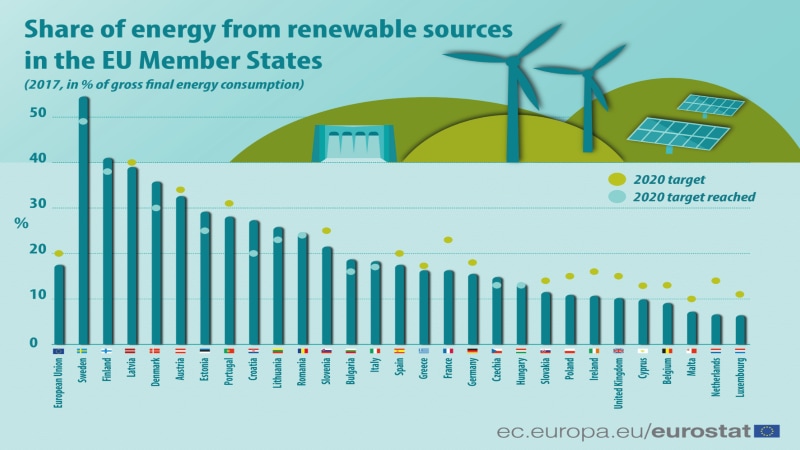January 16, 2020
Companies must take responsibility for their role in tackling climate change
Image credit: World Economic Forum
We’re entering the decade of climate action. It will be a crucial time for humanity and at Davos, this issue has taken its rightful place – at the center stage on the World Economic Forum's agenda.
Tackling climate change and establishing net-zero emissions is no longer a debate but an absolute necessity. We believe it will be good for business, too. EU modelling estimates that achieving net-zero emissions could add 2% to the bloc's GDP by 2050.
A green future will unlock new markets and prospects for European businesses, high-skilled jobs in dynamic new industries for the workforce, and cleaner air and healthier lifestyles for citizens.

Companies must take responsibility for their impact on the world around them and their role in tackling climate change. This isn’t a nice-to-have, corporate social responsibility (CSR) add-on; it’s about driving sustainable revenues through an approach to business that works with – not against – the world around it.
But there is some way to go in changing mindsets. The astronaut and US Senator John Glenn once reflected on climbing into an Atlas rocket on a launchpad in 1962: “I felt exactly how you would feel if you were getting ready to launch and knew you were sitting on top of 2 million parts — all built by the lowest bidder on a government contract.” This race to the bottom is a mentality that plagues both public and private sectors.
Decisions can no longer simply be made based on lowest cost and least effort. We have to consider the full lifecycle effect and impact of products, embedding sustainability into their development and supply chain, as well as scoring them on their contribution to a circular economy.
So what are the practical steps organizations can take? We believe that organizations need to adopt an integrated approach and embrace – to quote the UN environment program – “nature-based solutions”.
1. The Science-Based Targets Initiative (SBTI): The SBTI is a great initiative that organizations can sign up to and work with to build best practice guides and create the targets that are right for their business. The focus is on using these to increase innovation, reduce regulatory uncertainty, strengthen investor confidence and drive better profitability.
2. Green our buildings: the World Green Buildings Council’s Net-Zero Carbon Building program acknowledges that the built environment is a crucial aspect of a business’ impact on the world around it. The goal of this commitment is for the entire portfolio in the control of its signatories to be net carbon-neutral by 2030, and to push for all buildings to hit the same standards by 2050.
3. Decarbonize transport and promote the EV100: Transport accounts for 23% of global greenhouse gas emissions and is the fastest-growing contributor to climate change. The EV100 global initiative from The Climate Group promotes the shift to hybrid and electric transport models by demonstrating the business case for doing so.
4. Accelerate the shift to renewable energy: Energy imports cost the EU €26.1bn per month in 2018 – 70.2% of that was crude oil and 20.1% was natural gas. If EU businesses move towards renewable energy sources and focus on driving more efficient energy usage, we can break this reliance on costly imports of fossil fuels and drive high-skilled jobs in new industries at the same time.

The World Economic Forum and the town of Davos have led by example and taken action on their own message. In 2019, Signify conducted a retrofitting of the Congress Centre in Davos with more sustainable lighting – energy-efficient LEDs – as well as energy-efficient LED street lighting in Davos itself.
We – business leaders and policy-makers alike – must take this lead and act. If we’re to stay within the boundaries of the Paris Agreement, we must accelerate efforts. If we can achieve a 3% improvement on energy efficiency each year, driven by a similar 3% increase in infrastructure renovation rates, combined with a 3% annual increase in the use of renewables, we’ll be well on the way to achieving a carbon-neutral world by 2050. But we need to start now.
At Signify, we’ve made a commitment to becoming carbon neutral in all our operations by the end of 2020. We are calling on businesses to achieve carbon neutrality by at least 2030 and governments to create a carbon-neutral world by at least 2050.
This has to be the decade of climate action. No ifs or buts; it’s time to act and to lay the foundation for a cleaner, more inclusive and prosperous society for generations to come.
A version of this article first appeared at weforum.org
Signify (Euronext: LIGHT) is the world leader in lighting for professionals, consumers and the Internet of Things. Our Philips products, Interact systems and data-enabled services, deliver business value and transform life in homes, buildings and public spaces. In 2023, we had sales of EUR 6.7 billion, approximately 32,000 employees and a presence in over 70 countries. We unlock the extraordinary potential of light for brighter lives and a better world. We have been in the Dow Jones Sustainability World Index since our IPO for seven consecutive years and have achieved the EcoVadis Platinum rating for four consecutive years, placing Signify in the top one percent of companies assessed. News from Signify can be found in the Newsroom, on X, LinkedIn and Instagram. Information for investors is located on the Investor Relations page.
